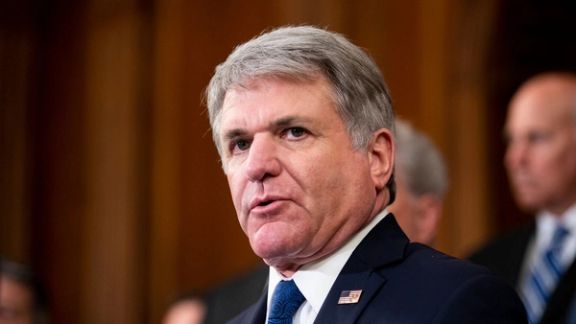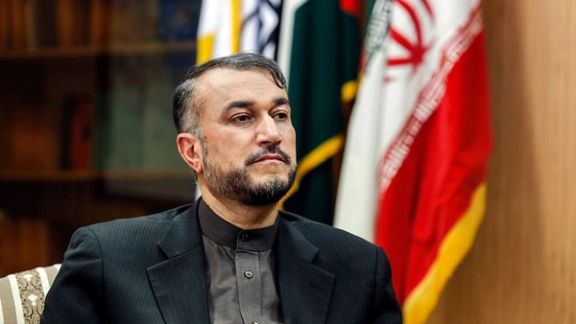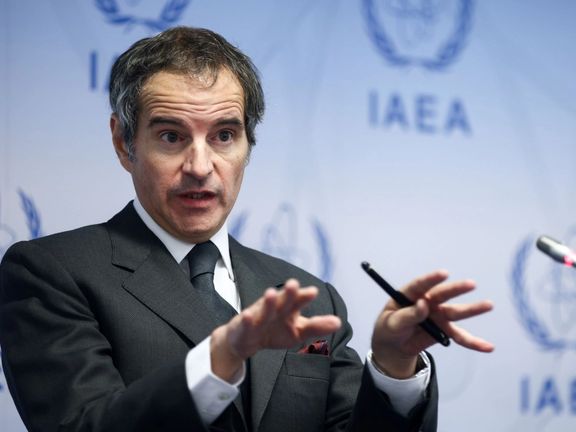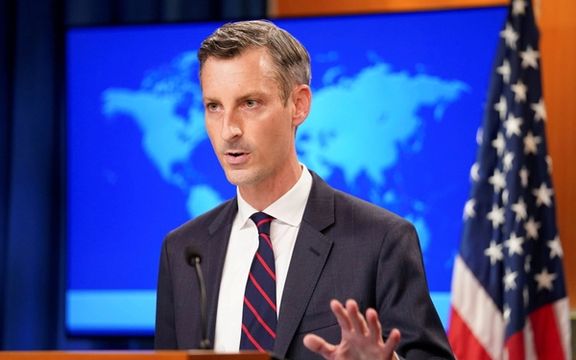US Lawmaker Says Biden Is Preparing For An Iran Deal Worse Than JCPOA

Republican Representative Michael McCaul has said that the US waiver of some sanctions on Iran’s nuclear program shows Washington is reaching a deal with Tehran.

Republican Representative Michael McCaul has said that the US waiver of some sanctions on Iran’s nuclear program shows Washington is reaching a deal with Tehran.
The twitter account for the House Committee on Foreign Affairs quoted McCaul Saturday as saying that the Biden administration “is preparing to cut a nuclear deal with Iran that would be worse than the original JCPOA”.
“We already know Iran will enter any new deal closer to amassing enough fuel for a nuclear weapon than it was under the JCPOA”, the Texas representative said.
Earlier On Friday, State Department spokesperson Ned Price said the waiver was not a sanctions relief and emphasized that the US will not provide sanctions relief to Tehran before it returns to its commitments under 2015 nuclear deal.
President Joe Biden's administration restored the sanctions waivers to allow international nuclear cooperation projects, drawing congressional criticism on the administration’s Iran strategy.
The waivers allow Russian, Chinese and European companies to continue cooperating with Tehran's non-proliferation projects including electricity generation at Bushehr nuclear power plant, Arak heavy water production facilities, and the Tehran Research Reactor. The Trump administration which pulled out of the JCPOA in May 2018 rescinded the waivers in 2019 and 2020 as part of his "maximum pressure" campaign.

Iran's foreign minister reiterated Sunday that the US move to waive some sanctions was good, but Iran wants to see tangible results and lifting of sanctions.
In an interview with the state-run television (IRIB), Hossein Amir-Abdollahian reiterated that executive orders or actions that restore the conditions to what they were before the US withdrew from the 2015 nuclear deal -- Joint Comprehensive Plan of Action (JCPOA) -- are considered as positive by Iran but what matters to Iran is seeing action from the American side, not "what happens on paper".
"For us it is important to see, tangibly and factually, the result of US moves in lifting the sanctions," he said, adding that so far Iran has not seen "serious and considerable initiatives" from the US side. "Initiative to us means what is observable in the talks with the 4+1 (France, Germany, Britain, Russia and China) in the non-papers exchanged between Iran and the US through the EU or when we can see some of the sanctions lifted in practice," he said.
Britain, France and Germany on Saturday urged Iran to grab the opportunity provided by the US move to restore the 2015 nuclear deal.
“This should facilitate technical discussions necessary to support talks on JCPOA return in Vienna,” negotiators of the European Troika said in a joint statement Saturday.
“We urge Iran to take quick advantage of this opportunity, because the timing of the waiver underscores the view we share with the US: we have very little time left to bring JCPOA talks to a successful conclusion.”
The EU foreign policy chief Josep Borrell said in a tweet Saturday that he had held an important call with Amir-Abdollahian ahead of the resumption of talks. "We need good faith, efforts from all sides, and a spirit of compromise to swiftly conclude the negotiations and go back to full implementation of the JCPOA," Borrel said.
According to state-run Press TV, in his phone talk with Borrell, Amir-Abdollahian reiterated that positive developments have taken place since the last round of negotiations in Vienna, but said such developments still fall short of meeting Iran's expectations.
The waivers allowed Russian, Chinese and European companies to continue cooperating with Tehran's non-proliferation projects including electricity generation at Bushehr nuclear power plant, Arak heavy water production facilities, and the Tehran Research Reactor. The Trump administration which pulled out of the JCPOA in May 2018 rescinded the waivers in 2019 and 2020 as part of his "maximum pressure" campaign.
The eighth round of Vienna talks broke on January 8 and negotiators returned to their capitals for consultations. Talks are expected to resume next week.
The Russian envoy to the talks in Vienna, Mikhail Ulyanov described the US decision to restore the nuclear waivers as "a move in the right direction" and said it would help expedite restoration of JCPOA and mutual return of US and Iran to compliance with 2015 deal. "It also can be seen as an indication that the Vienna talks have entered the final stage,”, he wrote on Twitter.
"Some believe that the move by the Biden administration is in fact in line with the White House's ‘blame game’ and cannot have positive effects on Iran's economy," Iran's state-funded Mehr News Agency said Sunday.
The Biden administration's decision raised a barrage of criticism from critics as a concession to Iran. A senior State Department official familiar with the waivers told the Associated Press Saturday that the move was not a “concession”, nor was it a signal that the US was about to reach an understanding on a mutual return to full implementation of the JCPOA.

The director of the International Atomic Energy Agency (IAEA) has reiterated concern over Iran’s explanation of uranium traces in sites used two decades ago.
In an interview with Dubai-based Al-Arabiya published Saturday, Rafael Mariano Grossi called on Iran to improve cooperation with the agency, which Tehran has reduced to that required under the Nuclear Non-Proliferation treaty.
Some analysts have linked what Grossi called “undeclared nuclear material” to Tehran’s past cooperation over centrifuges − devices used for enrichment − with Pakistani scientist AQ Khan.
Grossi said talks between Iran and world powers in Vienna to revive the 2015 nuclear deal, the JCPOA (Joint Comprehensive Plan of Action), were headed in the right direction but faced challenges.
“We must watch closely and be patient to reach a diplomatic solution,” Grossi said, noting that success hinged upon “what the political parties sitting at the negotiating table want.”
Under the JCPOA, the IAEA had extensive access to Iran’s nuclear program beyond that required under the NPT and the Additional Protocol that Iran first implemented 2003.
Iran reduced IAEA access to its nuclear sites in early 2021, when it boosted uranium enrichment demanding the lifting of US sanctions.
Grossi has reached an ad hoc arrangement with Tehran over access, which he says would allow him a full picture of the program if and when the JCPOA is back in place.

Iran’s national security council secretary has echoed remarks by the foreign minister that “verifiable” lifting of sanctions by the United States is required for a nuclear agreement.
In a tweet on Saturday, Shamkhani said, “Real, effective and verifiable economic benefit for Iran is a necessary condition for the formation of an agreement.” Earlier in the day, foreign minister Hossein Amir-Abdollahian told reporters in Tehran that Iran must have guarantees of US intentions and lifting of “some sanctions” can serve this purpose.
Shamkhani also demanded that no agreement can restrict Iran’s “right to continue research and development” in the nuclear program, which can be interpreted as a maximalist demand.
Tehran has been occasionally demanding that US should first lift sanctions to show its “goodwill”, but Washington argues that any unilateral step to remove sanctions might not reciprocated.
Talks to revive the 2015 nuclear agreement known as JCPOA took a recess in late January in what diplomats said was a critical stage for the United States and Iran to make key political decisions. US chief negotiator Rob Malley told MSNBC on Friday that the two sides have not agreed on key issues, such as which US sanctions should be lifted and what it means for Iran to return to JCPOA.
Malley said that US is willing to lift “most sanctions” imposed since former president Donald Trump withdrew from the agreement in 2018, but some were imposed for “Iran’s behavior” and are not related to the nuclear issue.

Iran’s foreign minister has said that the US reviving waivers for foreign firms acting in parts of Iran’s nuclear program “is not enough,” and it needs real guarantees.
Hossein Amir-Abdollahian noted Saturday that for talks to succeed in Vienna on restoring the 2015 Iran nuclear deal, the JCPOA (Joint Comprehensive Plan of Action), Washington still needed to guarantee it would abide by any agreement.
"In our view, goodwill in practice means that something tangible will happen on the ground. The lifting of some sanctions can, in the true sense of the word, translate into the goodwill that the Americans are talking about. What happens on paper is good, but not enough,” the Iranian foreign minister said.
The United States administration Friday defended its decision to lift the threat of sanctions against foreign companies working on aspects of Iran’s nuclear program. This followed a barrage of criticism from opponents of the Biden administration’s efforts to restore the JCPOA, who portrayed the move as a concession to Iran.
The waivers, which the US restored Friday, were withdrawn by President Donald Trump in 2019 and 2020. They had been in place for one or two years after Trump in 2018 withdrew the US from the JCPOA.
The waivers allowed continuing work to constrain Iran’s nuclear program as agreed under the JCPOA. The Chinese undertook modifications on the Arak reactor designed to preclude a route to a plutonium-based bomb, while Russian was involved in removing of supplying uranium fuel, including for the Bushehr power plant and the Tehran Research Reactor.
In a notice to Congress announcing the restoration of the waivers, the State Department explained that the move was “designed to serve US non-proliferation and nuclear safety interests and constrain Iran’s nuclear activities.”
The State Department said the move could help “facilitate discussions that would help to close a deal on a mutual return to full implementation of the JCPOA and lay the groundwork for Iran’s return to performance of its JCPOA commitments.”
Any agreement reached in Vienna would require a plan for Iran to reduce current stockpiles of enriched uranium, which might well be shipped out by Russia as was done after the JCPOA was agreed in 2015.
A state department official, speaking anonymously, told Reuters the waivers were needed for what the agency cited as “technical discussions central to the talks.”
Implementation Discussions
Similarly, Eurasia Group analyst Henry Rome told Reuters they waivers were “less a goodwill gesture or a concession to Iran, but rather technical steps that are probably aimed at ensuring implementation discussions can go forward in Vienna.”
Both State Department spokesman Ned Price and the State Department statement stressed that restoring waivers did not imply agreement had been reached in Vienna, nor that the US would lift ‘maximum pressure’ sanctions before Iran again accepted JCPOA limits.
The statement stressed that the waivers should not be seen as “a commitment or as part of a quid pro quo.”
Price tweeted Friday that the US would not provide sanctions relief to Tehran before it returns to its commitments under 2015 nuclear deal. "We did precisely what the last Administration did: Permit our international partners to address growing nuclear non-proliferation and safety risks in Iran," Price wrote.
Talks in Vienna between Iran and world powers to restore the JCPOA – with the US taking part indirectly - are expected to resume soon. The eighth round of talks broke last week as negotiators returned to their capitals for consultations.

The Biden Administration was quick to defend sanctions waivers for Iran’s nuclear program on Friday, after the move was perceived as a concession to Tehran.
State Department spokesperson Ned Price said the waiver was not a sanctions relief and emphasized that the US will not provide sanctions relief to Tehran before it returns to its commitments under 2015 nuclear deal.
"We did not provide sanctions relief for Iran and will not until/unless Tehran returns to its commitments under the JCPOA," the US State Department spokesman tweeted Friday after President Joe Biden's administration restored sanctions waivers for Iran to allow international nuclear cooperation projects.
Critics of the Biden Administration’s strategy to negotiate a restoration of the 2015 nuclear agreement with Iran were quick to criticize the moveas a concession to Iran, which might have prompted Price’s tweet.
Congressional pressure has been increasing on the Biden Administration to explain its Iran strategy, while the Vienna talks have dragged on for 10 months without a result and Iran has continued to expand its nuclear program.
The waivers allowed Russian, Chinese and European companies to continue cooperating with Tehran's non-proliferation projects including electricity generation at Bushehr nuclear power plant, Arak heavy water production facilities, and the Tehran Research Reactor. The Trump administration which pulled out of the JCPOA in May 2018 rescinded the waivers in 2019 and 2020 as part of his "maximum pressure" campaign.
Iranian officials have not commented on the Biden administration's move but Secretary of Iran's Supreme National Security Council (SNSC) in a ," tweet Saturday said no agreement can restrict "Iran's legal right to continue research and development" and "to maintain its peaceful nuclear capabilities and achievements" in an apparent reference to the Biden administration's restoration of the waivers.
After a meeting on Wednesday with Iran's top negotiator, Ali Bagheri-Kani, the spokesman of the Iranian parliament's National Security and Foreign Policy Committee, Mahmoud Abbaszadeh-Meshkini, said Bagheri-Kani had said the talks were moving in a positive direction but there were important issues that had to be resolved. According to Abbaszadeh-Meshkini, in his meeting with lawmakers Bagheri-Kani denied any direct talks with the US.
“The waiver with respect to these activities is designed to facilitate discussions that would help to close a deal on a mutual return to full implementation of the JCPOA and lay the groundwork for Iran’s return to performance of its JCPOA commitments,” the State Department said in a notice to Congress that announced the move.
“It is also designed to serve US non-proliferation and nuclear safety interests and constrain Iran’s nuclear activities,” the State Department said. “It is being issued as a matter of policy discretion with these objectives in mind, and not pursuant to a commitment or as part of a quid pro quo. We are focused on working with partners and allies to counter the full range of threats that Iran poses.”
The next round of indirect talks between Iran and the US in Vienna to restore the deal, Joint Comprehensive Plan of Action (JCPOA), are expected to resume soon. The eight round of talks broke last week and negotiators returned to their capitals for consultations.
"We did precisely what the last Administration did: Permit our international partners to address growing nuclear non-proliferation and safety risks in Iran," Price said in his tweet in response to critics who say the Biden administration is desperate to make a deal while Tehran continues to rule out any concessions.
The waiver was needed to allow for technical discussions that were key to the talks about a return to the deal, a senior State Department official told Reuters on condition of anonymity. The official added that restoring the waiver was not a signal that the United States was on the verge of reaching an understanding to return to the deal.
"The waivers are less a goodwill gesture or a concession to Iran, but rather technical steps that are probably aimed at ensuring implementation discussions can go forward in Vienna," Eurasia Group analyst Henry Rome told Reuters.